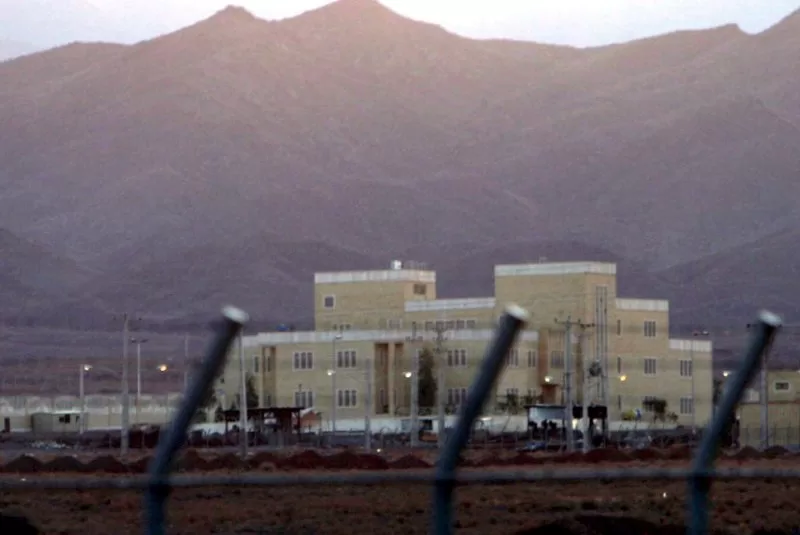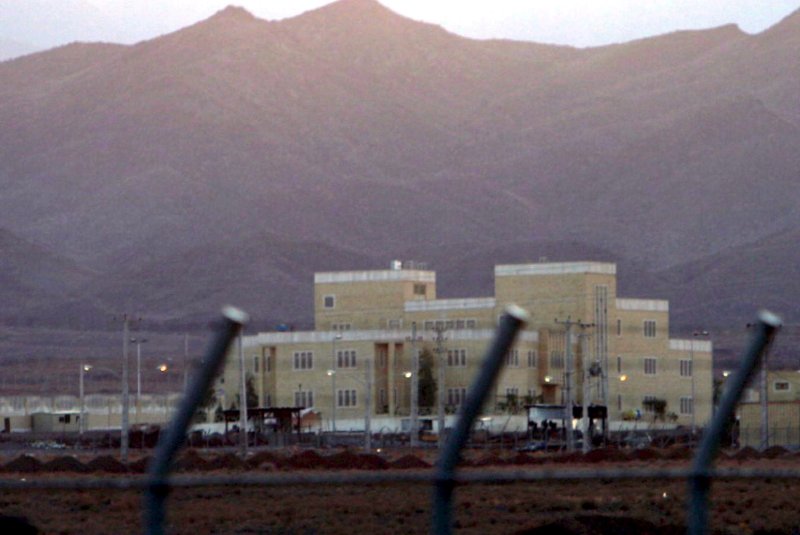Iran’s uranium fuel enrichment plant in Natanz, in central Iran. A censure from the U.N. nuclear watchdog over “undeclared nuclear activities” that Tehran slammed as unfair and futile prompted it to order the activation of what it said were advanced new uranium enrichment centrifuges. File photo by Abedin Taherkenareh/EPA-EFE
Nov. 22 (UPI) — Iran said Friday it had begun commissioning new advanced uranium-enrichment centrifuges after it was censured by the International Atomic Energy Agency.
The Atomic Energy Agency of Iran said in a statement reported by the state-run IRNA news agency that the resolution by the International Atomic Energy Agency was “politically motivated, unrealistic and counterproductive.”
The agency added it had “ordered effective steps, including the launch of a noticeable number of new and advanced centrifuges of different types,” after Britain, Germany and France accused Tehran of not cooperating with the U.N. watchdog’s monitoring regime.
“The steps are being taken to protect the country’s interests and further develop the peaceful nuclear energy in line with growing national needs [for electricity] and within the framework of Iran’s rights and obligations under the Safeguards Agreement,” the AEOI statement said.
However, the agency stressed it would continue to work with the IAEA on existing technical and safeguards cooperation agreements and said it was “well prepared for constructive engagement” based on international legal principles and standards.
Britain, Germany and France, dubbed the E3, told an IAEA meeting in Vienna on Thursday that the findings of Director General Rafael Grossi’s latest visit to Iran were “highly concerning,” citing an expansion of its uranium stockpiles of as much as 60% and well over four “IAEA significant quantities” of uranium enriched up to 60%, defined as the approximate level of nuclear material over which the manufacturing of a nuclear bomb could not be ruled out.
Grossi’s report found Iran’s enriched uranium stockpile had further expanded over the current reporting period, with its overall stockpile of enriched uranium now over 32 times the limit Iran committed to in the 2015 Iran nuclear deal it signed with the United States, China, Russia, Britain and France.
“Over the past five months, Iran has also substantially expanded its overall production capacity by installing and operating new advanced centrifuges; in the reporting period, it has installed six additional cascades of advanced centrifuges at Fuel Enrichment Plant in Natanz, thus further enhancing its enrichment capacity,” said the E3.
“Iran continues obstructing the work of the IAEA, which has had detrimental implications for the Agency’s ability to effectively verify and monitor Iran’s nuclear program and to provide assurance of the program’s exclusively peaceful nature.
The E3 added that the lack of transparency had led to the watchdog losing “continuity of knowledge in relation to the production and inventory of centrifuges, rotors and bellows, heavy water and uranium ore concentrate,” as detailed in Grossi’s report.
They accused Iran of fuelling a nuclear proliferation crisis which it was escalating by moving further away from commitments it agreed to under the Iran nuclear deal, the Joint Comprehensive Plan of Action signed in Vienna in 2015 — but which fell apart after former U.S. President Donald Trump pulled the United States out in 2018.
Adopting the resolution in a 19-3 vote, with 13 abstentions, the IAEA censured Iran over “undeclared nuclear-related activities” at four secret locations in the country and failure to provide “technically credible explanations for the presence of uranium particles of anthropogenic origin at several undeclared locations.
The censure also covered Iran’s refusal to reveal the location of nuclear material and/or contaminated equipment.
The IAEA was highly critical of Iran’s insistence it had declared all of the nuclear material and activities required under its Safeguards Agreement, saying the claim was inconsistent with its findings.
“The agency has not changed its assessment of the undeclared nuclear-related activities that took place at four undeclared locations in Iran, nor of the origin of the uranium particles of anthropogenic origin.”
It said that until Iran informed it of the current location of the nuclear material and/or contaminated equipment, the IAEA was unable to confirm the correctness and completeness of Iran’s declarations under its NPT Safeguards Agreement and, as a result, could not provide assurances that Iran’s nuclear program was “exclusively peaceful.”
In its submission to the IAEA board, the E3 called on Iran to halt and reverse its nuclear escalation and refrain from making threats to produce nuclear weapons, return to the limits imposed by the JCPoA, in particular those regarding enrichment.
They urged Tehran to implement a March 2023 Iran-IAEA joint statement and the commitments it made regarding transparency and cooperation, including reinstating all transparency measures halted in February 2021, and to install surveillance and monitoring equipment where requested.
The three governments also demanded Iran reverse a September 2023 decision to withdraw the credentials of experienced inspectors.

